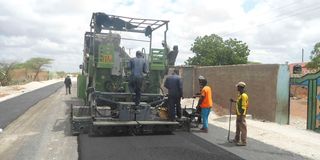How first tarmac road in Wajir changed the face of backwater town

Ongoing construction of a road in Wajir town.
Before 2014, Wajir was a sleepy rural backwater, but the construction of the county’s first tarmac road has totally transformed the town.
Wajir town, established by the British settlers in 1912 as a regional colonial office, is one of the country’s most remote places.
In 2013, Governor Ahmed Abdullahi announced a plan to have the main street tarmacked. It was exciting news as majority of the residents had never seen a tarmacked road.
A few lucky enough to travel had only seen tarmacked roads in Garissa and Nairobi. Today, the town has more than 30 kilometers of tarmacked road.
“Before the tarmac road, we had only two multi-storied buildings in town. We now have more than ten,” Mr Ahmed Dubow, a local, told theNation.
Also Read: How Ruto, Uhuru helped to shape devolution
The value of property along the tarmac has also increased, with modern buildings coming up.
“In the first term of devolution we did about 34 kilometres of tarmac in Wajir under very difficult circumstances including poor soil and resistance from the community,” Governor Ahmed Abdullahi said.
Implementing the project was not a walk in the park, he said.
“People thought I was crazy to initiate a tarmac road. The contractor started by digging and collecting all the sandy soil and then backfilling,” he said.
Mr Abdullahi said those who opposed the project believed it was not a priority.
“My idea was to have a county headquarters that could attract investors,” he said. Wajir town now has at least five hotels.
“The town is growing at a high rate, which means that we achieved our vision. I feel that I was vindicated,” he said.
With the town’s roads tarmacked, government bodies like the Kenya Urban Road Agency (Kura) came calling.
The agency is now planning to extend the tarmac to Tarbaj and Eldas towns.
“This project has opened up the town and the settlements around it for investment and development,” the governor said. The county government is currently tarmacking a two-kilometre stretch from the town centre to the new county assembly headquarters.
Ms Halima Abdullahi, a local trader, said security has improved in the town following the installation of street lights.
Before the road was tarmacked, residents relied on donkey carts to transport goods.
“We are currently paying as little as Sh100 to move from one point to another by taxi unlike before when we paid Sh500 for the same distance,” Ms Abdullahi said,adding that cases of respiratory illnesses have reduced because there is little dust.
“Our health has improved and people not complaining of infections caused by dust after the roads were tarmacked. We go to hospital for other ailments but not for diseases caused by dust,” she said.
Mr Abdirahaman Abdinasir said most parts of the town have been opened up and have attracted investors.
“We now have water purifying companies in this town unlike before when we used to get clean drinking water from Nairobi,” Mr Abdinassir said.
He said the road has reduced the distance between people, markets, services and knowledge. Wajir residents are now well-connected, he added.





